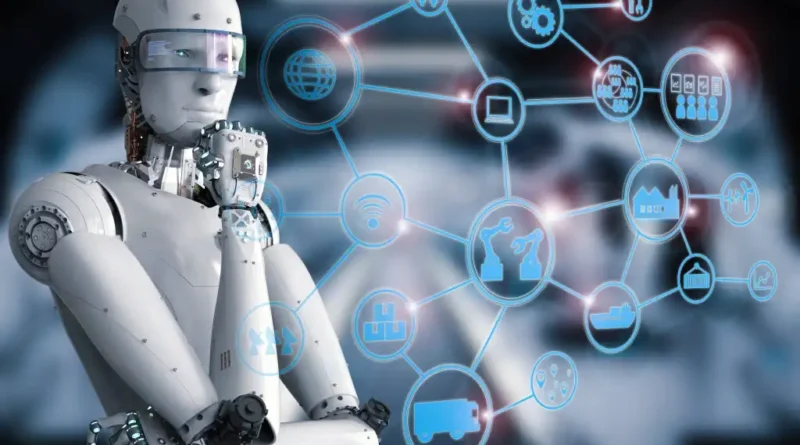How is AI Revolutionizing Various Industries?
Artificial Intelligence (AI) has rapidly transformed the way industries operate, revolutionizing processes and creating new opportunities. From healthcare to finance, transportation to entertainment, AI is enhancing efficiency, automating complex tasks, and providing insights that were once unimaginable. This article explores how AI is impacting different industries and the benefits and challenges it brings to the table.
AI in Healthcare
In the healthcare sector, AI is being used to improve patient care, reduce costs, and streamline operations. One of the most significant applications of AI in healthcare is in diagnostics. AI-powered systems can analyze medical images, such as X-rays and MRIs, with high accuracy, helping doctors detect diseases like cancer at an early stage.
Benefits:
- Early Diagnosis: AI helps in early detection of diseases, leading to more effective treatments and better patient outcomes.
- Personalized Treatment Plans: AI analyzes patient data to suggest personalized treatment options, increasing the effectiveness of medical interventions.
- Operational Efficiency: AI can automate administrative tasks, freeing up healthcare professionals to focus on patient care.
Challenges:
- Data Privacy: The use of AI in healthcare involves handling sensitive patient data, which raises concerns about data security and privacy.
- Regulation: AI applications in healthcare must comply with strict regulations to ensure they are safe and reliable.
AI in Finance
In the finance industry, AI is transforming the way banks, investment firms, and insurance companies operate. From automated trading to fraud detection and customer service chatbots, AI is reshaping financial services. One of the most prominent uses of AI is in algorithmic trading, where AI systems analyze market trends to make high-speed trading decisions.
Benefits:
- Fraud Detection: AI algorithms can analyze transactions in real-time to detect and prevent fraudulent activities, reducing financial losses.
- Customer Service: Chatbots powered by AI are improving customer service by handling routine queries and providing personalized recommendations.
- Risk Management: AI helps financial institutions assess risk more accurately, improving decision-making in lending and investment.
Challenges:
- Bias in Algorithms: AI systems can inherit biases from the data they are trained on, leading to unfair outcomes in lending or hiring decisions.
- Job Displacement: The automation of financial tasks may lead to job losses in certain areas, especially in customer service and administrative roles.
AI in Transportation
The transportation industry has also been significantly impacted by AI, particularly with the rise of autonomous vehicles. AI-powered systems enable self-driving cars and trucks to navigate roads, detect obstacles, and make decisions in real-time.
Benefits:
- Reduced Accidents: AI in autonomous vehicles can help reduce human error, which is responsible for a large number of traffic accidents.
- Efficiency: AI can optimize traffic flow and reduce congestion, leading to more efficient transportation systems.
- Lower Costs: Autonomous vehicles can reduce the need for human drivers, leading to lower transportation costs.
Challenges:
- Safety Concerns: While autonomous vehicles have the potential to reduce accidents, there are still concerns about their safety, especially in complex driving environments.
- Regulation: The widespread adoption of self-driving vehicles requires updated regulations to ensure their safe integration into existing transportation systems.
AI in Entertainment
AI is also transforming the entertainment industry, particularly in content creation and personalized recommendations. Streaming platforms like Netflix and Spotify use AI algorithms to suggest movies, TV shows, and music based on users’ preferences and viewing habits.
Benefits:
- Content Personalization: AI helps entertainment platforms provide more relevant and tailored content recommendations, enhancing user satisfaction.
- Content Creation: AI tools are being used to generate scripts, assist with video editing, and even create music, allowing creators to experiment with new ideas and streamline production processes.
- Audience Insights: AI helps entertainment companies understand audience behavior, enabling them to create content that resonates with viewers.
Challenges:
- Privacy Concerns: The data used to personalize recommendations may raise privacy concerns, especially when it comes to user behavior tracking.
- Creative Limitations: While AI can assist in content creation, there are concerns about whether it can truly replicate human creativity and emotion in art.
Conclusion
AI is having a profound impact on various industries, enhancing efficiency, improving decision-making, and creating new opportunities for innovation. While the benefits of AI are clear, challenges such as data privacy, algorithmic bias, and job displacement remain. As AI continues to evolve, industries must work towards creating solutions to these challenges while maximizing the potential of this transformative technology.

